
Teach Your Teachers Well
|
 |
|
| Maybeth Conway Senior Associate |
Throughout my career, I have found it to be true that my students have been my most powerful teachers. Again and again, young people have been the ones who have filled me with hope and delight, even when those gifts and talents came in the form of rough-cut gemstones whose worth was not readily apparent to everyone. I give those many young people my heartfelt thanks. Here are the lessons I learned from three of them.
Lesson 1: Perseverance
Definition: Perseverance is the effort to do or achieve something despite difficulties, failure, or opposition.
Synonyms: persistence, determination, tenacity, resolution
My perseverance teacher was a uniquely remarkable young man. Let’s call him Jim. Jim was a freshman in high school when I met him. He was not particularly handsome. His family was quite poor and his clothes were often worn and disheveled. He had severe cognitive impairments that made it difficult for him to read even the most elementary texts. He had very few friends.
Despite all of these challenges, Jim gave life his best. He came to school every day. He was respectful to his teachers and kind to his classmates, who often weren’t so kind to him. For four years, 180 days each year, he tenaciously tried to learn in an environment where he seldom met with success or affirmation. He simply persevered.
Lesson 2: Exuberance
Definition: Exuberance is a joyously unrestrained and enthusiastic response.
Synonyms: briskness, vitality, liveliness, vibrancy, vigor
My exuberance lessons were taught by a real charmer. We’ll call her Mary. We first met when I was the teacher in a juvenile shelter and she was a 15-year-old whose mother had her “streetwalking” in a rough inner city. In stark contrast to Jim, Mary was strikingly beautiful. She was also keenly intelligent.
For the first few weeks of her stay in my class, Mary was predictably angry, resentful, and non-compliant. In short, she was a pain. Once she settled in, that angry façade fell away and a disarmingly vivacious and appreciative young woman emerged. In this temporary placement that could offer little more than the rudiments of safety and nurturance, she quickly became a model of warmth and enthusiasm. In our school program, she was a prodigy, eagerly devouring the most challenging content that I could provide. I treasure the memory of the day that she walked into my office, threw herself down in a chair, and exuberantly announced: “You know what, Maybeth—I love to learn.”
Lesson 3: Optimism
Definition: Optimism is an inclination to put the most favorable construction on actions and events or to anticipate the best possible outcome.
Synonyms: hopefulness, buoyancy, brightness
For my optimism lessons, I returned to a public school setting and a teacher whom I’ll call Pete. Pete lost his sight to a rare form of cancer when he was a young child. For his entire school experience, he navigated his physical darkness with a spirit that epitomized brightness and buoyancy. He excelled academically. He was a successful wrestler and an accomplished member of the choir. He had a slew of friends and no problem snagging a date for the prom. Despite the lingering threat that his cancer could return, Pete was filled with hopefulness for the future. He embodied optimism.
Years have passed since I had the privilege of studying with these fine teachers. Life has not been kind to them. Jim recently lost his modest manufacturing job. Mary’s mother removed her from the juvenile shelter and forced her back onto the streets. Pete’s cancer returned soon after his high school graduation and he died a few years later. Yet their legacy to me, their student, lives on. In my personal and professional life, I often return to my memories of my time with them. I doubt that I will ever become as perseverant, exuberant, or optimistic as they were, but I will remain a dutiful student. In living their lives as they did, they reinforced those same traits in my own life practice. I owe them a great debt of gratitude.
“To be a teacher in the right sense is to be a learner. I am not a teacher, only a fellow student.”—Sören Kierkegaard
![]()
Center for Empowered Leadership ®
Email: info@cfel.org
Phone: 1.609.259.7911
